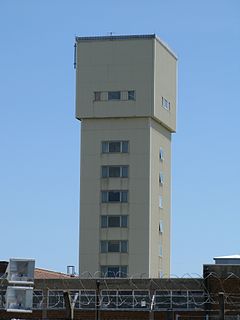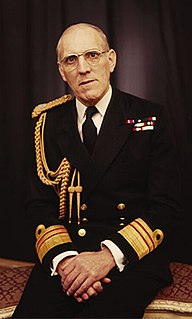John Rawlins (Royal Navy officer)
Last updatedSir John Rawlins | |
|---|---|
| Born | 12 May 1922 Wiltshire, England |
| Died | 27 July 2011 (aged 89) |
| Allegiance | United Kingdom |
| Service/ | Royal Navy |
| Years of service | 1946–1980 |
| Rank | Surgeon Vice Admiral |
| Commands held | RN Medical Director General (1977–80) Institute of Naval Medicine (1975–77) Director of Health and Research (Naval) (1973–75) |
| Awards | Knight Commander of the Order of the British Empire |
| Relations | Colonel Stuart Rawlins (father) |
Surgeon Vice Admiral Sir John Stuart Pepys Rawlins, KBE , FRCP , FRAeS (12 May 1922 – 27 July 2011) was a Royal Navy officer and pioneer in the field of diving medicine.
Contents
Royal Navy
Rawlins was the son of Colonel Stuart Rawlins. He was educated at Wellington College, read medicine at University College, Oxford and trained at Barts, graduating in 1945. [1] Soon after, Rawlins began his career as a surgeon lieutenant Royal Navy Volunteer Reserve officer and was assigned to the Colossus class aircraft carrier HMS Triumph in 1947. [1] After transitioning from the reserves to active duty in 1951, Rawlins was assigned to the RAF Institute of Aviation Medicine (IAM). [1] [2] He was appointed a Member of the Order of the British Empire in 1955 for his work with protective helmets, [3] and was promoted to the rank of surgeon commander while he continued his research at the IAM until 1961. [1] That year he was advanced to Officer of the Order of the British Empire for his work on the automatic underwater escape system. [3] Rawlins was also a member of the US Navy SEALAB project. [4]
Rawlins served as the RN Director of Health and Research from 1975 to 1977 and later as the RN Medical Director General from 1977 to 1980 when he retired as surgeon vice admiral. [1] [5]
Other honours
In 1971, Rawlins also served as the first "past president" on the founding executive committee for the European Underwater and Baromedical Society. [6]
The Gilbert Blane Medal of the Royal College of Surgeons was awarded in 1974 for his work on cold in diving. [3] Rawlins was a British Sub-Aqua Club Honorary Life Member as well as President of the Historical Diving Society and the Association of RN First Class Divers. [5] He received the Lowell Thomas Award from The Explorers Club in 2000. [2] [7]
Related Research Articles

The British Sub-Aqua Club or BSAC has been recognised since 1954 by UK Sport as the national governing body of recreational diving in the United Kingdom.
Rubicon Foundation, Inc. is a non-profit organization devoted to contributing to the interdependent dynamic between research, exploration, science and education. The foundation, started in 2002, is located in Durham, North Carolina and is primarily supported by donations and grants. Funding has included the Office of Naval Research from 2008 to 2010. Gibson, Dunn & Crutcher has provided pro bono services to assist in copyright searches and support.

Capt. Edward Deforest Thalmann, USN (ret.) was an American hyperbaric medicine specialist who was principally responsible for developing the current United States Navy dive tables for mixed-gas diving, which are based on his eponymous Thalmann Algorithm (VVAL18). At the time of his death, Thalmann was serving as assistant medical director of the Divers Alert Network (DAN) and an assistant clinical professor in anesthesiology at Duke University's Center for Hyperbaric Medicine and Environmental Physiology.

John Sebastian Bach Stopford, Baron Stopford of Fallowfield KBE FRCS FRCP FRS was a British peer, a physician and anatomist, and a Vice-Chancellor of the University of Manchester. Lord Stopford was described as "one of the greatest anatomists of this century".
The South Pacific Underwater Medicine Society (SPUMS) is a primary source of information for diving and hyperbaric medicine physiology worldwide.

A Submarine Escape Training Tower is a facility used for training submariners in methods of emergency escape from a disabled submarine underwater. It is a deep tank filled with water with at least one underwater entrance at depth simulating an airlock in a submarine. Since the 1930s, towers have been built for use by the Royal Navy, US Navy, Royal Australian Navy and in several other countries.
The Royal Australian Navy School of Underwater Medicine (RANSUM) is an instructor-led training course based at Sydney, Australia.
Captain Albert Richard Behnke Jr. USN (ret.) was an American physician, who was principally responsible for developing the U.S. Naval Medical Research Institute. Behnke separated the symptoms of Arterial Gas Embolism (AGE) from those of decompression sickness and suggested the use of oxygen in recompression therapy.
Air vice-marshal John "JE" Ernsting was a senior Royal Air Force (RAF) commander and renowned medical researcher.
National Board of Diving and Hyperbaric Medical Technology (NBDHMT), formally known as the National Association of Diving Technicians, is a non-profit organization devoted to the education and certification of qualified personnel in the fields of diving and hyperbaric medicine.

Capt. Charles Wesley Shilling USN (ret.) was an American physician who was known as a leader in the field of undersea and hyperbaric medicine, research, and education. Shilling was widely recognized as an expert on deep sea diving, naval medicine, radiation biology, and submarine capabilities. In 1939, he was Senior Medical Officer in the rescue of the submarine U.S.S. Squalus.

The Royal Navy Medical Service is the branch of the Royal Navy responsible for medical care. It works closely with Queen Alexandra's Royal Naval Nursing Service.
Vice-Admiral Sir John Gilchrist Thesiger Inglis,, sometimes known as Tommy Inglis, was a Royal Navy officer who served as Director of Naval Intelligence from 1954 to 1960. In this capacity, he attempted to cover-up the "Buster Crabb affair" in 1956.

The decompression of a diver is the reduction in ambient pressure experienced during ascent from depth. It is also the process of elimination of dissolved inert gases from the diver's body, which occurs during the ascent, largely during pauses in the ascent known as decompression stops, and after surfacing, until the gas concentrations reach equilibrium. Divers breathing gas at ambient pressure need to ascend at a rate determined by their exposure to pressure and the breathing gas in use. A diver who only breathes gas at atmospheric pressure when free-diving or snorkelling will not usually need to decompress, Divers using an atmospheric diving suit do not need to decompress as they are never exposed to high ambient pressure.
The European Underwater and Baromedical Society (EUBS) is a primary source of information for diving and hyperbaric medicine physiology worldwide. The organization was initially formed as the European Underwater and Biomedical Society in 1971 and was an affiliate of the Undersea Medical Society for several years. Its purpose is promoting the advancement of diving and hyperbaric medicine and the education of those involved in the field; EUBS provides a forum and a journal for exchange of information and promotes research into diving medicine.

Surgeon Vice-Admiral Sir James Watt was a British surgeon, Medical Director-General of the Royal Navy, 1972–1977 and maritime historian.
The King's Birthday Honours 1950 were appointments in many of the Commonwealth realms of King George VI to various orders and honours to reward and highlight good works by citizens of those countries. The appointments were made to celebrate the official birthday of the King, and were published in supplements to the London Gazette of 2 June 1950 for the British Empire, Australia, Ceylon and New Zealand.
Brian Andrew Hills, born 19 March 1934 in Cardiff, Wales, died 13 January 2006 in Brisbane, Queensland, was a physiologist who worked on decompression theory.
The Institute of Naval Medicine is the main research centre and training facility of the Royal Navy Medical Service.
References
- 1 2 3 4 5 "Survey of the Papers of Senior UK Defence Personnel, 1900–1975". King's College London, Liddell Hart Centre for Military Archives. Retrieved 29 July 2011.
- 1 2 "The Explorers Club Honors Clive Cussler and 12 Other Deep Sea Explorers". National Underwater and Marine Agency. Archived from the original on 6 January 2004. Retrieved 29 July 2011.
- 1 2 3 Rawlins, John (1976). "Man in the deep". South Pacific Underwater Medicine Society Journal. 6 (1). Archived from the original on 15 April 2013. Retrieved 27 March 2013.
{{cite journal}}: CS1 maint: unfit URL (link) - ↑ Davis, Michael (1979). "Immersion hypothermia in scuba diving". South Pacific Underwater Medicine Society Journal (Reprint from New Zealand Journal of Sports Medicine). 9 (2). Archived from the original on 13 January 2013. Retrieved 29 July 2011.
{{cite journal}}: CS1 maint: unfit URL (link) - 1 2 "Death of Surgeon Vice Admiral Sir John Rawlins, KBE, MA (Oxf), BB, BCh, FRCP, FFCM, FRAES". Minewarfare & Clearance Diving Officers' Association. Retrieved 29 July 2011.
- ↑ Bornmann, Robert C (1991). "Foundation for tenth years of accomplishment". Proceedings of the XVIIth Meeting of the European Underwater and Baromedical Society. Heraklion, Kriti, Greece: European Underwater and Baromedical Society.
- ↑ "The Lowell Thomas Award". The Explorers Club. Retrieved 29 July 2011.